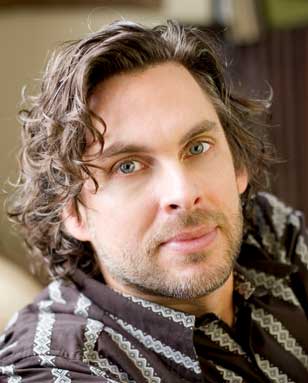Michael Chabon

Michael Chabon is an American writer of both literary and genre fiction. He has achieved the unprecedented goal of appealing to both literary snobs who despise genre fiction, and genre fiction snobs who despise the literati. Sometimes even at the same time. He has won both a Pulitzer Prize for Literature, and a Hugo Award for best Science Fiction Novel of the Year.
Most of his books are, in part, about Judaism or Jewish people. He has written Fantasy, Mystery, and Alternate History -- and even when he isn't writing genre fiction, he often writes about it.
Works written by Michael Chabon include:
- The Mysteries of Pittsburgh - A Coming of Age novel that explored a bisexual Love Triangle.
- The Amazing Adventures of Kavalier and Clay - Winner of the Pulitzer Prize. This was not, technically, a genre novel, but it was about The Golden Age of Comic Books, about as geeky a subject as one could want.
- Wonder Boys - Made into a movie starring Michael Douglas and Tobey Maguire. The screenplay was nominated for an Academy Award.
- Summerland - Best-selling YA fantasy novel.
- The Final Solution - A mystery novella starring an unnamed elderly detective who is probably Sherlock Holmes.
- Spider-Man 2 - Co-wrote the screenplay.
- Gentlemen Of The Road - A more traditional adventure novel. Chabon himself dubbed it "Jews with swords".
- The Yiddish Policemens Union - An Alternate History noir novel set in Alaska. Winner of the Hugo Award.
- Manhood for Amateurs - A collection of autobiographical essays.
- The Astonishing Secret of Awesome Man - A children's book about the titular superhero (yes, really).
Michael Chabon provides examples of the following tropes:
- All Jews Are Ashkenazi
- Partially averted in Gentlemen of the Road.
- Alternate History
- Author Appeal:
- This is likely the reason he writes so much "low-brow" genre fiction: he likes to write in genres that he genuinely enjoys reading.
- Aside from that, Chabon (who is Jewish) loves Jewish history and culture. It figures prominently in most of his books.
- Bi the Way
- Big Applesauce
- Disappeared Dad / Missing Mom: Frequently. Art Bechstein's mom in The Mysteries of Pittsburgh, Sammy Clay's dad in The Amazing Adventures of Kavalier and Clay, Ethan Feld's mom in Summerland, Meyer Landsman's dad in The Yiddish Policemen's Union, etc.
- Fanfic: The Final Solution is essentially this for the Sherlock Holmes stories
- No Name Given: The protagonist of The Final Solution, deliberately done to conceal the fact that he's really Sherlock Holmes
- Reconstruction: He's one of the most respected writers in America, yet many of his books take on subjects usually seen as meaningless pop culture, as if to prove that they can have literary merit if done right.
- The Amazing Adventures of Kavalier and Clay - Reconstructs Golden Age superhero stories by telling a story from the POV of the men who wrote them, showing how important they are to American culture.
- Summerland - Reconstructs adolescent High Fantasy like The Chronicles of Narnia by giving it a fresh setting -- in this case, a fantasy-world based on American culture and folklore.
- Gentlemen Of The Road - Reconstructs Two-Fisted Tales and pulp adventure stories.
- The Yiddish Policemens Union - Reconstructs traditional Film Noir and Hardboiled Detective stories, again, by giving it a fresh setting -- an Alternate History version of America where a thriving Yiddish culture exists on the Alaskan frontier.
- George Lucas Throwback: Frequently does this in literary form (see Reconstruction).
- Purple Prose: Is known for this.
- So My Kids Can Read: Probably the main reason he wrote Awesome Man.
- Shown Their Work: He does lots of research for every novel he writes. And it shows.
- What Could Have Been: According to The Other Wiki, he was involved in pitching story ideas for the X Men and Fantastic Four movies, but all of his ideas were rejected. And he once pitched an original screenplay that he described as a Romantic Comedy "about old Jewish folks on a third-rate cruise ship out of Miami", but the producer that he was working with decided not to take it.
- Yiddish as a Second Language
This article is issued from Allthetropes. The text is licensed under Creative Commons - Attribution - Sharealike. Additional terms may apply for the media files.